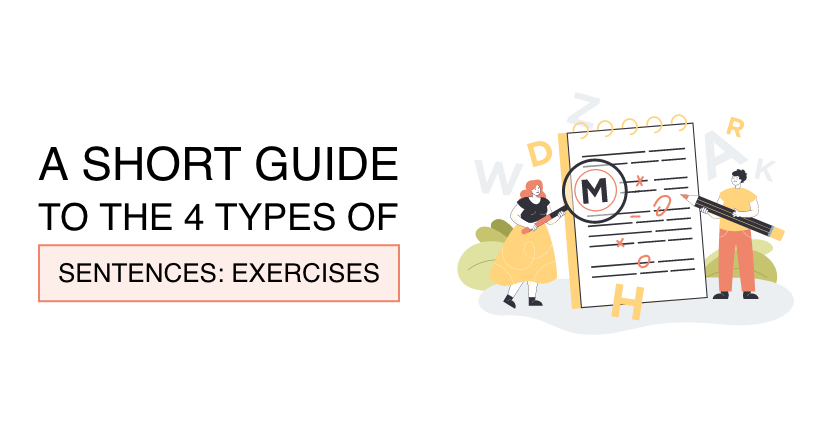4 Types of Sentences with Examples – An Ultimate Guide

The four types of sentences in English – declarative, interrogative, imperative, and exclamatory – help us to communicate efficiently and state our point clearly.
Your work will be more interesting and will convey your ideas more clearly if you use a diversity of sentences.
In this blog post, we have discussed all types of sentences in detail. Continue reading this post for more information.
1) Declarative sentences
A declarative sentence is the most common sentence in the English language. We use these sentences daily.
It is a type of sentence that:
- Gives a clear explanation
- Conveys facts
- Makes a clear statement
While writing essays, students use declarative sentences. However, some learners struggle to write declarative sentences precisely.
If you want to learn how to use declarative sentences in your essays, you can
contact us right now.
Examples of declarative sentences
- I love cherry.
- Alexander walked home alone.
- Her mother is a professor.
Declarative sentences can be compound sentences. A few examples are given below:
- Kim does not know how to swim, so she is taking classes.
- She wants to eat pizza, but she does not know how to make it.
- They want to visit Japan, and they spend a day at a hotel.
Declarative sentences can also be complex sentences. These are the examples:
- David found a new job because he loves working online.
- Jasmine ordered an Espresso when she got to the coffee shop.
You can use complex-compound sentences to make declarative sentences:
- The weather was awesome in the village, so we stayed until it started raining.
- Katherine does not enjoy pool parties and she hates dress dressing up, although she likes being with me.
- Although the service at that restaurant was slow, the pizza was really delicious, and the prices were pocket-friendly.
2) Interrogative sentences
The sentence in which you ask a question is called an interrogative sentence. It might start with words, such as what, who, where, or when.
Interrogative sentences end with a question mark.
Examples of interrogative sentences
- How many pets do you have?
- May I sit here, madam?
- Whose pencil is this?
Interrogative sentences can be compound sentences. A few examples are given below:
- Who are you, and where are you going?
- How much does this smartphone cost, and what are its specs?
- I do not know his contact number, so can you call him?
Interrogative sentences can be complex sentences. A few examples are given below:
- Can you please call me when she arrives?
- When Elizabeth gets in, can you call me?
Interrogative sentences can be compound-complex sentences. These are some examples:
- Is the case solved, and William is in jail, or is he still working on it?
- Stephanie moved to New York, and Anderson stayed in the town, but are they divorced now?
Imperative sentences
The sentences in which you tell someone to perform any particular task are called imperative sentences.
The majority of imperative sentences end with a full stop, but some may end with an exclamatory sign.
Examples of imperative sentences
- Please keep quiet.
- Stop smoking.
- Go ahead.
Imperative sentences can be compound sentences. A few examples are given below:
- Please keep quiet and listen to me!
- Please order me a latte or pick up a soda for me.
Imperative sentences can be complex sentences. Some examples are:
- Hand this kid a cup of milk right now that he is done studying.
- Since Naomi was up all night, please let her sleep today.
Imperative sentences can be compound-complex sentences. These are some examples:
- Do not be too late, even if you are having fun.
- As much as you would help, I am unavailable this evening, so ask Denny instead.
Exclamatory sentences
The sentences in which you express strong emotions are called exclamatory sentences.
Just like declarative sentences, they provide information, but you need to put an exclamatory sign at the end.
Examples of exclamatory sentences
- How beautiful she is!
- Wow, what a gigantic six!
- This is Sparta!
Exclamatory sentences can be compound sentences. A few examples are given below:
- His new job is the best opportunity, and it offers several perks.
- I know you wanted to visit Spain, so I bought you a ticket!
Exclamatory sentences can be complex sentences. Some examples are:
- You people can start the party once Chesterfield arrives!
- You make me worry when you are not with your father!
Exclamatory sentences can be compound-complex sentences. These are some examples:
- Now that the judges have made the decision, I can tell you that you won the contest.
- Since you helped me when I wanted to become a writer, I am writing a poem for you!
Make your sentences stronger!
Not every sentence is created equally. As a result, some
sentence structures require a little more effort to perfect. So practice these sentences in your writing and write flawless content.